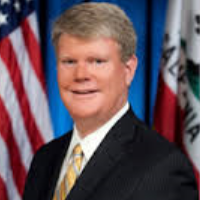Legislature Ends Bid to Copyright Public Documents
 Rep. Mark Stone (D-Monterey Bay)
Rep. Mark Stone (D-Monterey Bay)
By Nick Cahill, Courthouse News Service
SACRAMENTO — A contentious proposal giving California complete copyright authorization over public records has been dismantled by lawmakers following prudent opposition from a coalition of free speech and open government advocates.
Assembly Bill 2880 initially sought to give records created at taxpayer expense, including legislative reports, maps and recorded hearings, federal copyright and trademark protections and allow state and county governments to control and even prohibit their use.
The bill’s sweeping copyright and open-government implications sparked fierce resistance from a broad collection of civil liberty groups and journalists, led by the Electronic Frontier Foundation (EFF) and the California Newspaper Publishers Association.
Last week, the groups dropped their opposition of AB 2880 after the bill’s author, Assemblyman Mark Stone (D-Monterey Bay) agreed to amend the bill for the fourth time and ditch the blanket copyright provisions. Stone and his staff met with the opponents earlier this month and hashed out final changes to the bill.
Stone’s scaled-down proposal now focuses on protecting state trademarks by improving contract laws with third-party vendors.
The San Francisco-based EFF was the first group to attack the bill in April, and it says it was inundated with phone calls after Stone’s bill passed the Assembly on June 2.
The bill cleared the Assembly floor with little debate by an alarming 76-3 margin, with just three Republicans voting against it.
Ernesto Falcon, legislative counsel for the foundation, testified against the bill during an Assembly committee hearing in April and is credited with sounding the alarm against the overreaching copyright bill.
“It’s total victory on our part,” Falcon said of the amendments. “Stone has relented on his initial plans and has really narrowed the bill to a contracting-process bill, which was the original purpose.”
The initial bill stems from a copyright dispute between a now-former concessionaire and the federal government over Yosemite National Park trademarks. Stone told an Assembly committee in April that the proposal centered on protecting the state’s trademarks and didn’t reach “unnecessarily” into copyright law.
Despite Stone’s assurances, a flood of criticism spread against AB 2880. The First Amendment Coalition called the bill “a remedy in search of a problem,” while the California Newspaper Publishers Association warned that the bill could “limit the public’s ability to use records that a state or local agency has created.”
Also concerned with the bill’s potential impact on the public’s ability to access records, the California Chamber of Commerce and the Internet Association pledged opposition to AB 2880.
Mounting criticism led Stone to meet with the groups at the Capitol earlier this month to discuss potential changes to the bill. Stone eventually amended the bill for the third time on June 16, but the changes didn’t go far enough to sway the critics.
Jim Ewert, general counsel for the California Newspaper Publishers Association, was in the meeting with Stone and said the June 16 amendments still contained a clause that could potentially limit the California Public Records Act. Ewert said all of the opposition groups rejected the changes and continued to petition for further improvements.
Copyright law is a complex subject and it was important that Stone and the other lawmakers understood the damaging effects AB 2880 as proposed would have on journalists and ordinary citizens, Ewert said.
“It even took lawmakers time to get up to speed on the copyright implications contained in the bill,” Ewert said.
In a victory for the opponents, Stone removed the exemptions to the Public Records Act and the blanket copyright clause regarding the state’s intellectual property.
“AB 2880 improves the state’s contracts with third parties where intellectual property is at stake. The most recent amendments remove most, if not all, of the opposition and they will allow for all stakeholders to continue the policy discussion about how California can best manage its intellectual property and preserve public access to information,” Stone said in a statement to Courthouse News.
The updated bill now simply includes a provision that forces the state to “consider the intellectual property rights” when soliciting contracts with vendors. It passed the state Senate Governmental Organization Committee Tuesday without debate and advanced to the Senate Appropriations Committee.
Falcon called the two-month fight over AB 2880 gratifying, and thanked Stone for making changes when he could have continued pushing the controversial bill through the Senate.
“What we ended up doing was preserving the status quo, the status quo being a very good place,” Falcon said. “We didn’t move the needle anywhere, we made sure the needle didn’t move the wrong way.”
To Learn More:
Georgia Claims its Laws are Copyrighted and Publishing them is an Act of Terrorism (by Steve Straehley, AllGov)
Car and Truck Makers Say that when you Own a Vehicle, You don’t Own Computer System that Runs It (by Steve Straehley, AllGov)
Judge Sees No Copyright Violation in Google’s Massive Book-Scanning Operation (by Noel Brinkerhoff and Danny Biederman, AllGov)
- Top Stories
- Controversies
- Where is the Money Going?
- California and the Nation
- Appointments and Resignations
- Unusual News
- Latest News
- California Forbids U.S. Immigration Agents from Pretending to be Police
- California Lawmakers Urged to Strip “Self-Dealing” Tax Board of Its Duties
- Big Oil’s Grip on California
- Santa Cruz Police See Homeland Security Betrayal in Use of Gang Roundup as Cover for Immigration Raid
- Oil Companies Face Deadline to Stop Polluting California Groundwater





